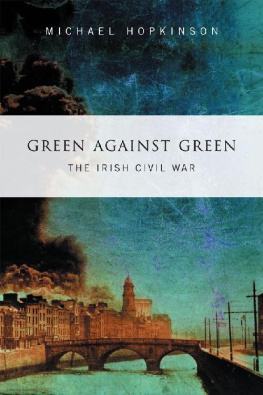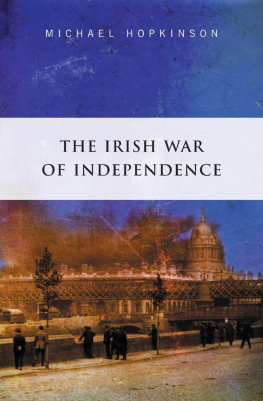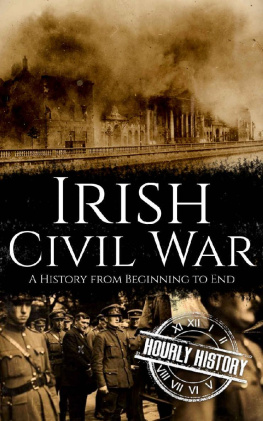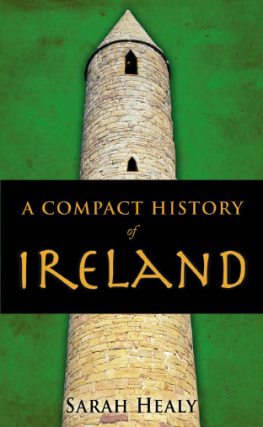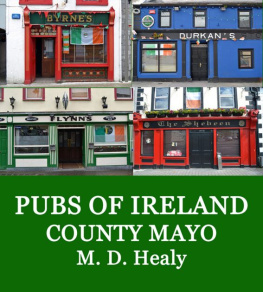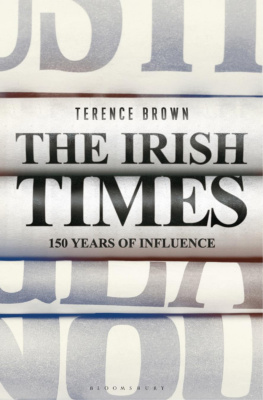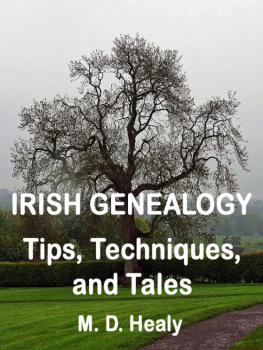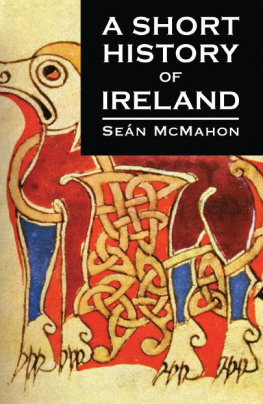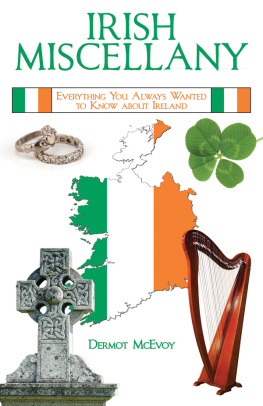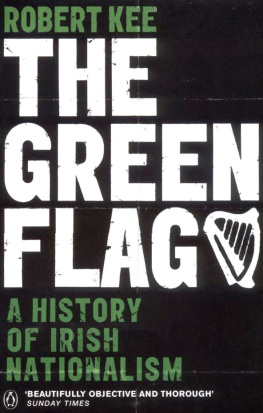GREEN AGAINST GREEN
THE IRISH CIVIL WAR
Michael Hopkinson
Gill & Macmillan
To my mother and my late father
Contents
It was an episode which has burned so deep into the heart and mind of Ireland that it is not yet possible for the historian to approach it with the detailed knowledge or the objectivity which it deserves and sooner or later must have. So many of the divisions and hatreds that were to scar the political and social life of Ireland for the next two decadesand are visible even todaystem from those months of internecine warfare that charity and the interests of truth alike demand a certain reticence about events which are still felt so profoundly and yet so little understood in their inner meaning.
F. S. L. Lyons, Ireland since the Famine, first edition (1971)
Preface
T HERE has been a wealth of detailed and stimulating writing, particularly in the last twenty years, on many aspects of the Anglo-Irish Treaty and Civil War period. No satisfactory history of the war, however, has been written. This book aims to adopt a fresh and scholarly approach and to place the conflict in a wide twentieth-century Irish context.
My research was greatly aided by the availability during the last fifteen years of a vast amount of new primary material, representing all aspects of the Treaty and war. In many respects, moreover, the 1980s is a better decade for writing about the Civil War than the 1960s, during which the two previous war histories were written. The last two decades have seen considerable changes in Irish politics and society, which have aided new historical approaches and perspectives. The old Civil War issuesof constitutional status and Anglo-Irish relationsno longer dominate Irish politics; passions resulting from the conflict have cooled somewhat with the death and retirement of many war veterans. The young of the Twenty-Six Counties today are much less likely than earlier generations to wish to identify emotionally with the war. Meanwhile the concentration of so much attention on the Northern question since the late 1960s has produced a great revival of interest on historical aspects of the North and changed attitudes to the North by some Southern historians and politicians. The present crisis in the North has thrown a sharp relief on the 1920-23 period when many similar issues were faced.
Because of the lack of crucial archives, F. S. L. Lyons felt that no definitive history of the war could be written. That remains true. A considerable volume of government and military material either remains unavailable or no longer exists. My concentration on personal collections, British government papers and, to a lesser extent, on oral evidence is an acknowledgment of the lack of state archival material in the Twenty-Six Counties. Disappointing also has been the attitude of the Stormont authorities who prevented me from gaining access to almost all relevant papers in the Public Record Office of Northern Ireland, some of which have been worked on by other historians. Readers are even prevented from consulting correspondence relating to the wedding present the Northern Ireland government gave to the then Princess Elizabeth!
There are many technical and intellectual difficulties in writing on the subject: it does not lend itself to a chronological and narrative approach. Developments were highly complex and confusing; the writer is often forced to describe chaos. The war had an ill-defined beginning and end; the fighting was erratic, extremely confusing and highly regionalised. The subject requires sympathy and understanding for a range of diverse attitudes, and a knowledge of the background and developments in the South and North of Ireland, in Britain and in Irish-America. On the periods sundry delicate and controversial incidentsthe assassination of Sir Henry Wilson and the death of Michael Collins, to quote the two most notorious examplesthe historian has to act as something resembling a detective.
It is hardly surprising that a bitter, incestuous conflict in a small country, which saw neither compromise nor reconciliation at its end, has been extremely difficult for Irish historians to write about in a detached manner. Many personal memoirs of the Irish revolutionary periodthose of Michael Brennan, Dan Breen and Tom Barry, for instancehave very little to say about the Civil War: it was far easier for them to write about the Anglo-Irish conflict.
To study the conflict is necessary for an understanding of the establishment of the Free Statein that context reticence can no longer have any virtue. Many of the wars eventsthe executions and the Kerry atrocities, for instanceare extremely unpleasant to write about; to do so can only be justified by a wish to place them, as far as possible, in the context of the conflict.
I have adopted an analytical approach, while providing the necessary chronological base, and have written separate chapters on the North in order to bring out Northern themes more clearly and to facilitate the account of Southern affairs by making it unnecessary to switch frequently to developments on the other side of the border. I have placed a heavy emphasis on regional developments. Too much Irish history has been written from a Dublin- or Westminster-centred perspective, frequently in conjunction with an over-concentration on high politics. My own work on the regions is necessarily incomplete, and there is a need for detailed local studies.
Only the kindness and generosity of considerable numbers of people have made an ambitious project possible. My greatest debts in Dublin, during several long stays, go to Michael and Judith Hutchinson and family, and to Rodney and Susan Thom and their family. In Dublin also, James McGuire, Peter and Isobel Fox and Maeve Bradley were the most helpful of friends. Many there also gave valuable advice: Tom Garvin, who read an early draft of the opening chapters, Dr Len Broin, Arthur Mitchell, John McColgan, David Fitzpatrick, Michael Laffan, Ronan Fanning, the late Professor T. D. Williams, the late Professor R. Dudley Edwards, Dr Risterd Mulcahy and Mrs Rita Childers. Michael MacEvilly has been of invaluable assistance and has saved me from many errors relating to the war in the west. Of Civil War contemporaries, the late Colonel Dan Bryan, the late Mire Comerford, Dr T. OReilly and the late Dr C. S. Andrews gave generously of their time. I am also very grateful to the staffs of the UCD Archives, the National Library, the State Paper Office, the Public Record Office and the Records Department of TCD. Special thanks are owed to Kerry Holland at the UCD Archives, and Commandant Peter Young. Dr Garret FitzGerald kindly gave me permission to work on his fathers papers. So much of my interest in Irish history was stimulated by Professor F. S. L. Lyons; I was as saddened by his tragic death as were so many other Irish specialists.
In Belfast, Peter and Mary Blair and Peter and Belinda Jupp gave warm friendship and hospitality. I am grateful also to Peter Smyth, Dr A. T. Q. Stewart, Professor J. C. Beckett, Jennifer Fitzgerald and Paul Bew. The staff of the Public Record Office of Northern Ireland strove to assist me despite the attitude of Stormont to scholars in twentieth-century Irish history.
In England, John OBeirne Ranelagh, Charles Townshend and Josie Howie gave valuable help, and I owe much to the staffs of the Public Record Office at Kew, the House of Lords Record Department, the British Library, and the British Museum Newspaper Library. Ian and Jenny Gibbs gave generous hospitality. In Scotland, I have been helped by Professor D. A. G. Waddell, Professor R. T. Campbell, Dr Robin Law, Dr John McCracken, Dr Neil Tranter and Dr Iain Hutchison, among my colleagues. I am thankful also to the staff of Stirling University Library and the National Library of Scotland, and to the Inter Library Loans facility. My greatest debt at Stirling has gone to the friendship and help of Dr Richard Holt, Fiona Crayton Hutchison, Kim and Bryan, and to Bernie McDougall. My students over many years in the Irish history course at Stirling have helped to keep my interest alive.

